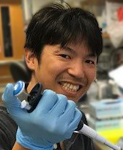Atsushi Fukuda Junior Associate Professor
 |
AffiliationSchool of Medicine, Faculty of Medicine, Basic Medical Science and Molecular Medicine ContactE-mail : fa972942[at]tsc.u-tokai.ac.jp |
Degree/ License
Ph.D.
Biography
- 2012
- Ph.D. Graduate School of Tokyo University of Agriculture.
- 2012—2016
- National Research Center for Child Health and Development. Center for Regenerative Medicine. Researcher
- 2016—2017
- National Research Center for Child Health and Development. Center for Regenerative Medicine. Senior Researcher
- 2017—2019
- Department of Stem Cell and Regenerative Biology. Harvard University. (Kevin Eggan lab) (JSPS Postdoctoral Fellowships for Research Abroad)
- 2019~2020
- Institute of Innovative Science and Technology, Tokai University; Assistant Professor
- 2020~2021
- Institute of Medical Science, Tokai University; Junior Associate Professor
- 2021~
- Tokai Unibersity
School of Medicine, Faculty of Medicine, Basic Medical Science and Molecular Medicine
(Junior Associate Professor, Ministry of Education Excellent Young Researcher)
Research Field
Using human ES/iPS cells, our laboratory conducts basic research for neuronal disease modeling and translational research based on transcription and epigenomic states. In particular, through X chromosome inactivation, which is the representative epigenomic event in women, we try to understand the differentiation propensity based on sex and the X-linked disease. We also use genome editing and next generation sequence technologies to accomplish functional and molecular analysis.
Keywords
Human pluripotent stem cell, Epigenetics, Sex difference, Genome editing, Neuronal differentiation
Membership (of Academic Organization)
- The society for molecular biology
Honors
- The society for Reproduction and Development 2012 (Best presentation)
- Reproduction Prize 2017 (Best paper in 2016)
Message
We are very welcome for people who has interests in molecular mechanisms underlying neuronal disease and in epigenetic research using human ES/iPS cells.


